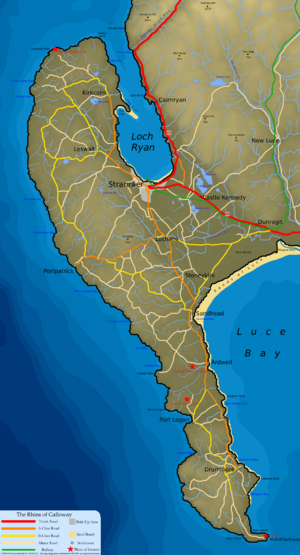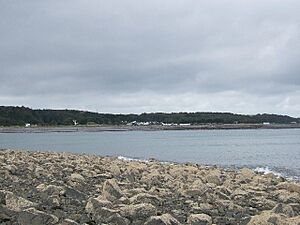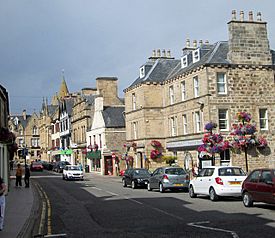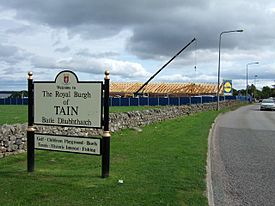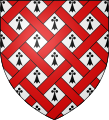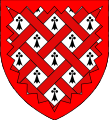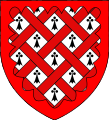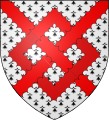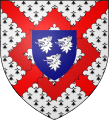Clan McCulloch facts for kids
Quick facts for kids Clan MacCulloch |
|||
|---|---|---|---|
| Motto | Vi Et Animo (From Lat. By strength and courage) | ||
| Profile | |||
| Region | Lowlands | ||
| District | Galloway | ||
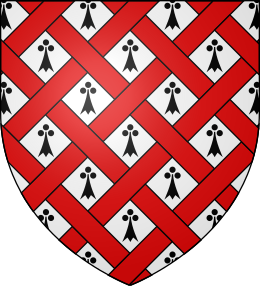 |
|||
| Clan MacCulloch has no chief, and is an armigerous clan | |||
| Historic seat | Myreton Castle;Cardoness Castle. | ||
| Last Chief | McCulloch of Myreton. | ||
| Died | 1704 | ||
|
|||
Clan MacCulloch is a very old Scottish family from a region called Galloway in the Scottish Lowlands. Historians believe they were one of the most important families there during the Middle Ages. Even though their very early history isn't fully clear, a book called History of the Galloway Families of McCulloch by Walter Jameson McCulloch shares a lot about their family tree and stories. This book uses old Scottish records and letters to tell the tale of many different branches of the family.
Today, Clan MacCulloch is known as an Armigerous clan. This means they no longer have a recognized leader, called a Clan chief.
Contents
- History of the MacCullochs
- McCullochs in Ulster and North America
- What the Name McCulloch Might Mean
- Y DNA and Origins
- McCullochs in the Scottish Parliament
- Coats of Arms
- Castles of the MacCullochs
- MacCulloch Tartans
- Different Ways to Spell the Name
- See also
History of the MacCullochs
Where the Name McCulloch Comes From
The name McCulloch comes from Celtic languages and is mostly found in Galloway and Wigtownshire. It's a patronym name, meaning "mac" stands for "son of." So, McCulloch means "son of Cullaich" or "son of Ulagh."
The first time the name McCulloch was written down was in 1285. A man named Thomas McCulloch (written as "MacUlauth") made a payment of 320 cattle. Later, in 1296, Thomas, Michael, and William McCulloch swore loyalty to Edward I of England. This event is recorded on the Ragman Rolls. Thomas McCulloch's seal had a picture of a squirrel on it. This same Sir Thomas McCulloch became the Sheriff of Wigtownshire by 1305.
Some historians think the McCullochs became powerful in Wigtownshire because they supported Roland (also known as Lochlann), the Lord of Galloway, in a small fight in the late 1100s. The McCulloch family owned lands like Torhouse, Myreton, and Ardwell in Galloway until 1682.
McCullochs and the Balliol Kings
The McCullochs supported the Balliol family's claim to the Scottish throne, rather than Robert the Bruce. This was a big deal because Robert the Bruce later became a hero for Scottish independence.
In medieval times, areas like Galloway were almost like their own small kingdoms, usually supporting the King of Scots. But after King Alexander III died, the McCullochs, like other Galloway families, chose to support John Balliol, whose mother was Lady Dervorguila of Galloway. They stayed loyal to the Balliols even after King John lost his throne. Sir Patrick McCulloch even went into exile in England with Edward Balliol.
When Edward Balliol tried to become King of Scotland, many McCullochs, including Sir Patrick and his sons, supported him. Because they supported Balliol and King Edward I of England, King Robert the Bruce took away many of the McCullochs' lands in Galloway.
Around 1364, Sir Patrick McCulloch returned to Scotland. King David II gave back some of the McCulloch lands. This might have been part of a bigger agreement between the kings of England and Scotland.
McCullochs of Myreton (Galloway)
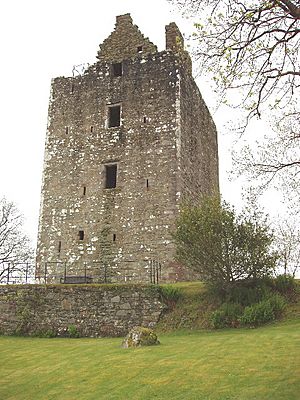
The McCullochs of Myreton were a Scottish Lowland family who lived in Myreton, Ardwell, in Wigtownshire. Their home overlooked Luce Bay. Unlike some other McCulloch families, they were not part of another clan but had their own territory. Later, they lived at Cardoness Castle.
From the late 1300s to the mid-1400s, they were strong friends with the Earls of Douglas. They helped the Douglases by providing soldiers and ships, and were part of their council. McCullochs even fought alongside the Douglas army against the English at the Battle of Homildon Hill in 1402.
Even after the powerful Douglas family lost influence, the McCullochs remained strong. They built castles at Myretoun, Cardoness, and Barholm, helping to defend Scotland's coast. Their power grew with Sir Alexander McCulloch (died 1523). He was a favorite of King James IV of Scotland. Sir Alexander was the king's chief falconer, sheriff of Wigtown, and captain of the Royal Palace of Linlithgow. His family even guarded the new Prince James in 1512.
In 1507, Sir Alexander attacked the Isle of Man to get revenge for an English raid. His daughter, Margaret, married another Alexander McCulloch, known as 'Sandy.' Sandy was a favored member of the king's guard and often jousted with King James IV. At the Battle of Flodden, Sandy McCulloch was one of ten men who wore armor just like the king's to confuse the English. Sadly, the trick didn't work, and both King James IV and Sandy McCulloch were killed.
After King James IV's reign, the McCullochs' power on the national stage lessened. However, they remained important in Galloway. Several influential branches grew from the Myreton line. The McCullochs of Ardwell and Killasser supported Mary, Queen of Scots. Some McCullochs also served as soldiers and officers in wars across Europe, like the Thirty Years' War. Two brothers, John and James McCulloch, became famous scholars and doctors, even serving as physicians to King James VI/I.
The chief of the Clan McCulloch of Myreton was given the special title of Baronet in 1634. However, this title ended when Sir Godfrey McCulloch faced serious consequences in Edinburgh in 1697 for a serious crime he committed years earlier. This event brought a difficult time for the Myreton family. Sir Gilbert McCulloch, the next chief, was killed while serving in the military in Flanders in 1704. After this, the leadership of the family passed to the McCullochs of Ardwall.
MacCullochs of Plaids (Ross-shire)
Another MacCulloch family, the MacCullochs of Plaids, settled in Easter Ross in the Scottish Highlands by the 1300s. They were known for following the Earl of Ross and Clan Ross, and also as close allies (called septs) of the Clan Munro. The MacCullochs married into the Clan Ross family so often that they were included in Ross family histories.
Historians believe this family came from outside the north-east of Scotland. Some think they might be connected to the Galloway MacCullochs, but there's no clear proof. The first record of a MacCulloch in Ross-shire was in 1431. Alexander MacCulloch signed a document with a seal that looked like the coat of arms of the Galloway families. The estate of Plaids gave its name to this northern MacCulloch family.
Several MacCullochs from Ross-shire became religious leaders (Canons Regular) at Fearn Abbey.
Alexander MacCulloch of Plaids
Alexander MacCulloch of Plaids was an important person from 1436 to 1443, working for the Earl of Ross. He received land and the job of managing the town of Tain. He also witnessed important documents for the Earl. His daughter married George Munro of Foulis, and later Munro chiefs came from this marriage.
John MacCulloch of Plaids
John MacCulloch of Plaids is recorded from 1450 to 1466. He inherited lands from his father, Alexander. In 1458, the Earl of Ross asked John MacCulloch, who was in charge of the special area around Sanct Duthowis in Tain, to help defend Inverness.
Angus MacCulloch of Plaids
Angus MacCulloch of Plaids was active from 1483 to 1498. He helped his neighbors with land documents and, along with other important citizens, granted land in Tain in 1484. The MacCullochs are said to have fought with the Mackenzies against Alexander MacDonald of Lochalsh in the Battle of Blar Na Pairce. Angus MacCulloch was later accused of taking cattle and horses in 1498.
William MacCulloch of Plaids
In 1505, William MacCulloch of Plaids gained ownership of several lands. He officially became the heir to his father, John, in 1512. King James IV of Scotland also granted him a special document for his lands and the job of managing Tain. He was involved in legal matters in Inverness in 1513 and 1514. He won a case in 1534 about land ownership. William MacCulloch died in 1541. He was married to Agnes Ross and was succeeded by his son, Thomas.
Thomas MacCulloch of Plaids
Thomas MacCulloch of Plaids became the heir to his father, William, in 1541. He was involved in legal decisions in Inverness in 1542 and 1547. It is believed that Thomas MacCulloch joined the Scottish army with his chief, Robert Munro, to fight the English invasion. Both Thomas MacCulloch and Robert Munro were killed at the Battle of Pinkie in 1547. Thomas MacCulloch had married a sister of Alexander Innes and was succeeded by his son, Robert MacCulloch.
Robert MacCulloch of Plaids
Robert MacCulloch of Plaids was the last of his family to own the Plaids estate, from 1547 to 1552. He inherited his father's lands and the job of managing Tain. He was also excused from paying certain taxes because his father died fighting for Scotland. In 1552, he sold the lands of Plaids and the management job in Tain to his uncle, Alexander Innes. After this, the MacCulloch name was no longer connected with these lands.
Other MacCulloch Families in Ross-shire
- MacCullochs of Kindeace and Glastullich: These families owned lands in Nigg and Logie-Easter from the 1600s. They were related to the MacCullochs of Plaids. One Roderick MacCulloch of Glastullich was a captain in the Jacobite army during the Jacobite rising of 1745. His lands were taken away, but he later received a pardon. Another MacCulloch, Andrew MacCulloch of Tain, was a merchant and sea captain who tried to rescue Prince Charles Edward after the Battle of Culloden in 1746.
- MacCullochs of Cadboll: This family in Ross-shire was connected to the MacCullochs of Plaids, but their exact family link isn't known.
- MacCullochs of Pilton/Pitneilies/Mulderg: These families came from the MacCullochs of Cadboll. Sir Hugh MacCulloch of Pilton, a knight who died in 1688, claimed to be related to the Myreton family in Galloway.
- MacCullochs of Tarrell: This family held land in Tarbat. An Angus MacCulloch of Tarrell was recorded in 1484 and was among those killed fighting for Clan Ross in 1486 at the Battle of Auldicharish. The lands of Tarrell eventually passed to the Munro family through marriage in 1577.
MacCullochs of Oban (Argyll)
A different group of MacCullochs, the MacCullochs of Oban, lived near Oban, Argyll, and the island of Kerrara, on Scotland's west coast. MacCulloch of Colgin was seen as the leader of this line. They are thought to be descendants of the MacLulichs, who lived under the Clan MacDougall. Some sources even say they came directly from the MacDougalls themselves.
McCullochs in Ulster and North America
Northern Ireland is very close to Galloway, so people likely traveled between these places for a long time. One of the first recorded migrations of Clan McCulloch to Northern Ireland was when Sir William McCulloch of Myreton moved there in the early 1600s. His son, Alexander McCulloch, later settled in County Antrim around 1634.
Descendants of these McCullochs in County Antrim later became important landowners in North Carolina, USA. Two famous Confederate generals, Benjamin McCulloch and his brother Henry Eustace McCulloch, came from this family line.
In 1609, James McCulloch of Drummorrell was involved in the Ulster Plantation, a plan to settle Scottish and English people in Ireland. He was given land in Donegal, but he sold it a few years later.
Many McCullochs also moved to North America and other parts of the world. For example, John McCullough of Bohemia Manor (Maryland) was a son of Sir Godfrey. John McCulloch, Sir Godfrey's nephew, moved to New Jersey through Ulster. His descendants include Major John McColloch, who created McCulloch's Path, and Major Samuel McCulloch, famous for McColloch's Leap.
What the Name McCulloch Might Mean
Son of a Boar
In Scottish Gaelic, the name might be MacCullaich, which means "son of a boar." However, the name is almost never spelled this way in old records. Also, the seal of Thomas McCulloch, an early figure, showed a squirrel, and the first family coats of arms featured wolves, which makes this idea less likely.
Hound of Ulster
Another idea is that the name comes from the Irish Gaelic MacCú'Uladh, meaning "son of the Hound of Ulster." This name is often spelled McCullough or MacCullagh in English. Kings of Ulster used this name as early as the 1200s. But there's no clear proof that the Irish name is directly linked to the Scottish McCulloch name. DNA studies show that families with similar names like McCullough and MacCullagh have different origins.
Gwallawc
Sir Andrew Agnew, a historian, suggested that the McCullochs were an ancient Pictish people named after a 6th-century chieftain called Gwallawc. Gwallawc was a king who might have conquered parts of Galloway.
Cullo O'Neill
A story passed down by US Supreme Court Justice James Iredell says the family came from Cullo O'Neill, an Irish man who served in the army of Edward Bruce (brother of Robert the Bruce). The story says King Robert the Bruce knighted Sir Cullo O'Neill and gave him lands in Wigtownshire. In 1331, Sir Cullo O'Neill died, and his son, Sir Godfrey, supposedly took the surname MacCullog. However, this story is doubtful because the McCulloch name was already in use before 1285.
Ulgric
Another old story suggests the family came from Ulgric, a leader of soldiers from Galloway who fought in the Battle of the Standard in 1138.
Y DNA and Origins
Sir Andrew Agnew thought the McCullochs were Pictish because they were an old Galloway family. Others have suggested they came from the Gall-Goídil, a mix of Norse and Gaelic people who settled in western Galloway in the 1000s.
However, modern Y DNA tests show that documented descendants of the McCulloch of Myreton family belong to a group called R1a. These DNA results make the origins of Clan McCulloch even more mysterious, as they don't strongly support the Pictish, Gaelic, or Norse-Gaelic theories for the main Myreton line.
McCullochs in the Scottish Parliament
Several McCullochs served in the Scottish Parliament, helping to make laws and decisions for Scotland. Some of them include:
- Alexander McCulloch of Drummorrell, from Whithorn, served from 1669–74.
- Andrew McCulloch of Tain, served in 1649.
- Sir Godfrey McCulloch, Laird of Myrtoun, from Wigtownshire, served in 1678.
- James McCulloch of Tain, served in 1648.
- James McCulloch of Findhorn, served in 1649.
- James McCulloch of Whithorn, served in 1649 and 1650.
- John McCulloch, of Myrtoun, from Wigtownshire, served in 1641.
- John McCulloch, Provost of Stirling, served from 1685–1686.
- Thomas McCulloch, bailie of Tain, served from 1639–41.
- William McCulloch, Laird of Myrtoun, from Kirkcudbright, served in 1612 and 1617.
Coats of Arms
Different McCulloch family lines have their own special coats of arms, officially recorded with the Court of Lord Lyon.
Galloway Coats of Arms
- Makcullo of Mertoun: Features three wolves' heads on a blue shield.
- McCulloch of Cardoness: Has a pattern of red bars on a white shield, with three wolves' heads on a small blue shield in the middle.
- McCulloch of Ardwell: Shows a pattern of red bars on a white shield. The crest is a hand throwing a dart.
- McCulloch of Drummorrell: Similar to Ardwell, with a border. Their motto is "Verus et Sedulus" (True and Diligent).
- McCulloch of Barholm: Has an engraved red bar pattern and three wolves' heads on a blue shield. It also has two armored men holding spears as supporters.
- McCulloch of Mule and Inshanks: Features red bars on a white shield with an indented border.
- McCulloch of Ardwall: Shows red bars on a white shield within a red border.
- McCullock of Kirkclaugh: Similar to Ardwall, but with an engraved border.
Ross-shire Coats of Arms
- McCulloch of Pilton: Features an engraved red bar pattern on a white shield.
- McCulloch of Cadboll: Shows a pattern of red bars on a white shield.
Castles of the MacCullochs
- Cardoness Castle: Built in the 1470s, this was the home of the McCullochs of Cardoness.
- Barholm Castle: This castle was the home of a branch of the McCullochs of Myreton, known as the McCullochs of Barholm.
- Killasser Castle: Another home of the McCullochs of Myreton in Ardwell, now in ruins.
- Myreton Castle: The main home of the McCullochs of Myreton, built in the 1500s. It was sold to the Clan Maxwell in 1685 and is now in ruins. It was built on the site of an even older castle from the 1100s.
MacCulloch Tartans
The MacCullochs from Ross-shire, who were close to the Clan Munro and Clan Ross, can wear those clans' tartans. The MacCullochs of Oban, who were connected to the Clan MacDougall, can wear their tartan or the District of Galloway tartan.
However, the MacCullochs themselves don't have their own official clan tartan today. This is because the last recognized clan chief died before one could be created. The tartan sometimes thought to be the MacCulloch clan tartan is actually a personal design for one individual.
Different Ways to Spell the Name
"McCulloch" is the most common spelling today for the family from Galloway. "MacCulloch" is more often used for the family from Ross-shire.
Hundreds of years ago, not many people could write, and records were sometimes in Latin. Because of this, the spelling of names changed a lot. This is why there are many modern spelling variations. Also, DNA tests show that some families with names like McCullough or McCullagh are not genetically related to the McCullochs. To make it even more confusing, some families changed their spelling when they moved from Scotland to Ireland or North America.
Here are some ways the name McCulloch and similar names have been spelled:
- Culloch
- Gulloch
- McCullough
- MacCoulaghe
- McCullagh
- MacChullach
- MacGillhauch
- M'Ilhauch
- M'Ylhauch
- Makkillauch
- MacAlach
- MacCulloch
- MacCullaich
- MacCullough
- McCulla
- MacCulla
- MacCullow
- McCollough
- McColloch
- McCoulough
- McCully
- McCulley
- McCullagh
- McCullah
- McCullow
- McCullar
- McCuller
- McCullers
- McCullick
- McCulligh
- McCulloch
- McCullogh
- McCullock
- McCulloh
- McCollough
- McCullouch
See also
- Horatio McCulloch
- John Ramsay McCulloch
- Benjamin McCulloch
- Henry Eustace McCulloch
- McColloch's Leap
- Hugh McCulloch
- John MacCulloch
- Cardoness Castle
- Unicorn Pursuivant
- Ormond Pursuivant
- Marchmont Herald
- Lord of Galloway
- Cruggleton Castle
- Gatehouse of Fleet
- Torhouse
- Candida Casa
- Dunskey Castle
- Stoneykirk
- Earl of Ross
- Clan Munro
- Clan Ross
- Edward Balliol
- McCulloch (disambiguation)
- McCullagh
 | James Van Der Zee |
 | Alma Thomas |
 | Ellis Wilson |
 | Margaret Taylor-Burroughs |


